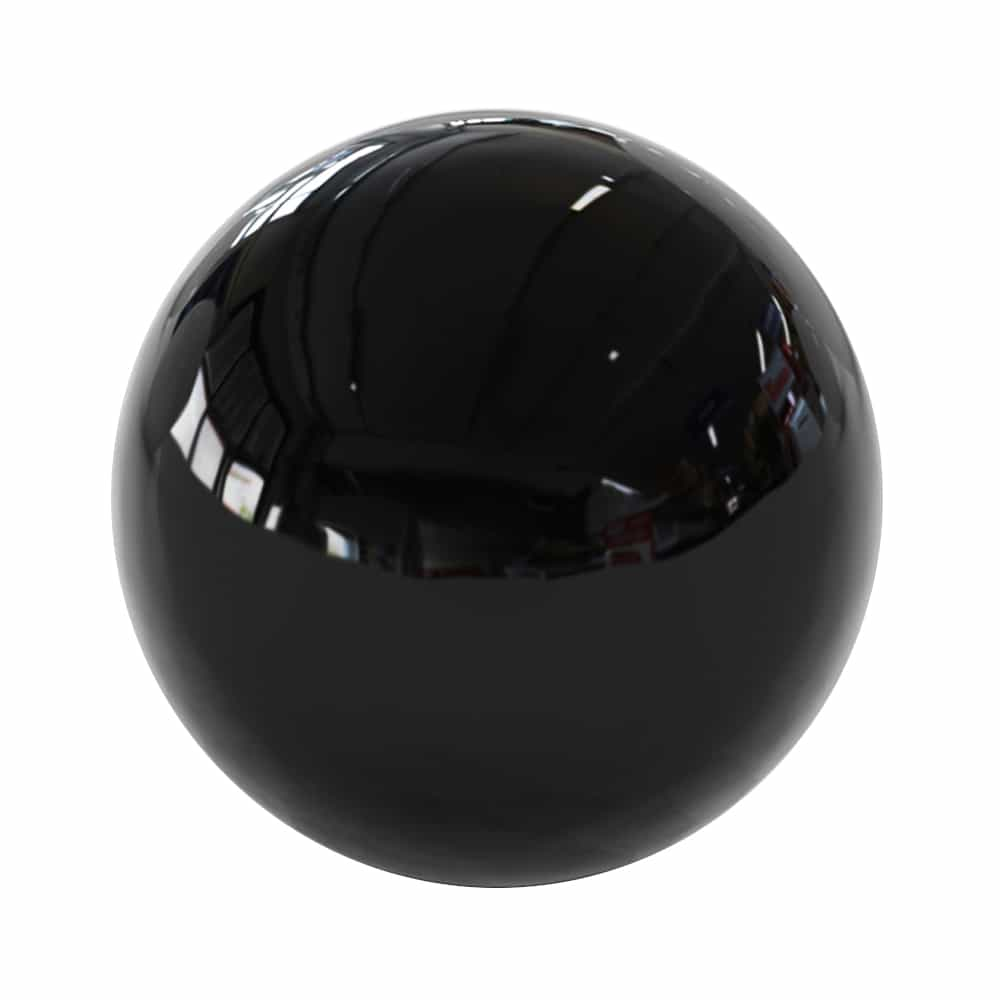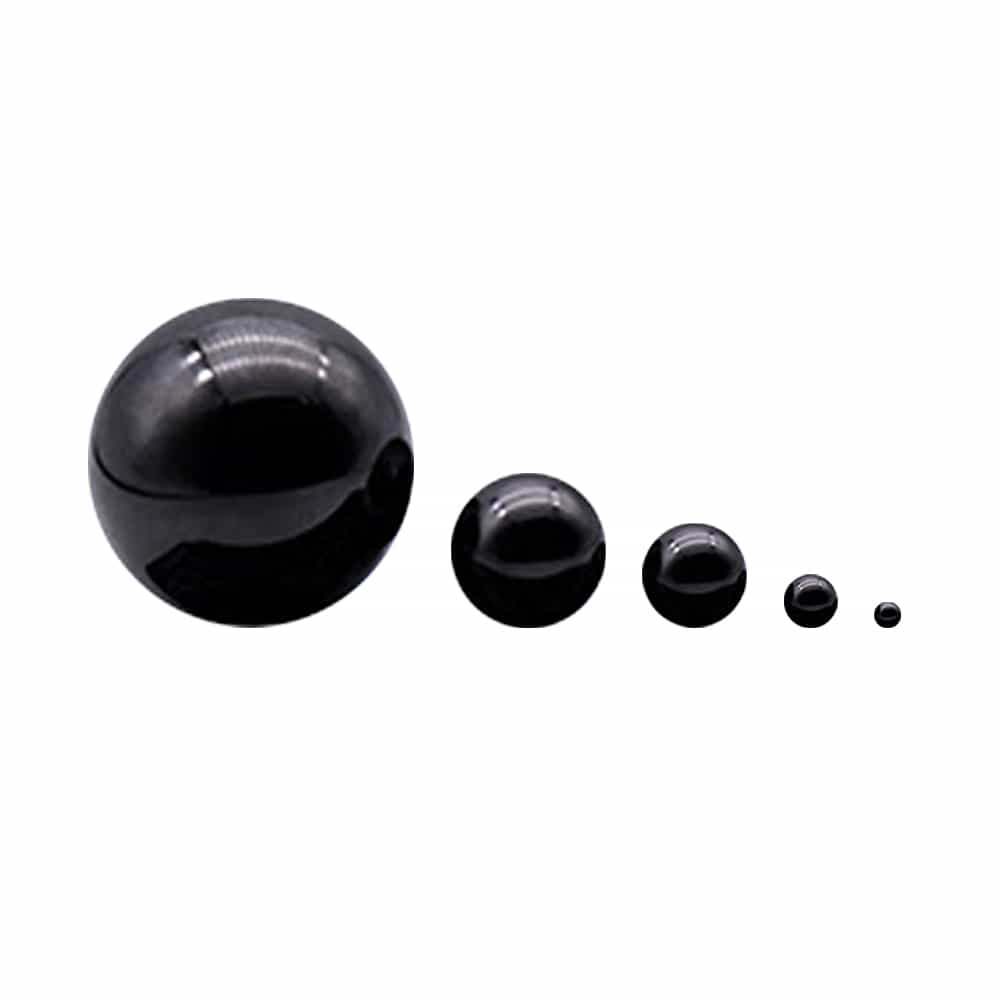What are Silicon Nitride Balls Used For?
Silicon nitride (Si3N4) ceramic balls play a key role in modern engineering due to their strong mechanical properties and versatility. They provide advanced performance in many demanding applications. In this blog, we'll discuss how these balls are used, why they're favored in certain industries, and how they enhance machinery efficiency and lifespan.
Understanding Silicon Nitride Balls
Silicon nitride balls are precision-engineered components made from Si3N4, an advanced ceramic material. They are tough, lightweight and can resist wear, heat, and corrosion. These balls are ideal for bearings in industries like aerospace, automotive, and energy. Their strength and durability help improve the efficiency and lifespan of critical machinery.

Key Properties of Silicon Nitride Balls
High Heat Resistance:
- Withstand temperatures up to 1800°F without losing strength or hardness.
- Ideal for high-temperature areas like aerospace and automotive industries.
Low Friction:
- Reduces friction in ball bearings, leading to smoother operation and less wear.
- Improves the efficiency and lifespan of mechanical systems.
Lightweight:
- 58% lighter than steel, which reduces centrifugal force and wear during high-speed operations.
- Benefits applications where weight reduction is critical, such as in aerospace and electric vehicles.
Chemical and Corrosion Resistance:
- Inherent Material Properties: Silicon nitride is a chemically inert ceramic, so it doesn’t easily react with other substances. This keeps the balls strong, even in harsh chemicals or extreme conditions.
- Resistance to Oxidation: Unlike many metals, silicon nitride doesn’t rust or corrode when exposed to oxygen and moisture. This helps the bearings last longer and reduces the need for maintenance.
- Stable Performance: Silicon nitride balls stay strong and functional in a wide range of temperatures and chemical environments. This makes them reliable in industries like aerospace, automotive, and chemical processing.
Comparison with Traditional Steel Balls
- Weight: Silicon nitride balls are much lighter than other materials. This helps bearings run faster and more efficiently.
- Hardness: 121% harder than steel, providing greater wear resistance and longer service life.
- Thermal Properties: Silicon nitride has lower thermal expansion and higher thermal conductivity than steel. This reduces the need for extensive cooling.
- Non-Conductivity: Silicon nitride balls, unlike steel, do not conduct electricity. This makes them perfect for use in electric motors and generators.
|
Property |
Silicon Nitride Balls |
Traditional Steel Balls |
|
Weight |
58% lighter |
Heavier |
|
Hardness |
121% harder |
Less hard |
|
Thermal Expansion |
Lower |
Higher |
|
Thermal Conductivity |
Higher |
Lower |
|
Electrical Conductivity |
Non-conductive |
Conductive |
|
Chemical Resistance |
Highly resistant |
Moderate resistance |
|
Corrosion Resistance |
Excellent |
Prone to corrosion |
|
Wear Resistance |
Superior |
Standard |
|
Magnetic Properties |
Non-magnetic |
Magnetic |
Why Choose Silicon Nitride Balls?
- High Performance: Ideal for high-speed and high-impact applications where traditional materials may fail.
- Longevity: Extended service life reduces maintenance costs and downtime.
- Versatility: These balls are used in many industries, including aerospace and automotive. They are also ideal for medical devices and renewable energy.
Applications of Silicon Nitride Balls
To answer the question ‘What are Silicon Nitride Balls Used For?’, we will delve into the following sectors.
Aerospace and Defense
In the aerospace and defense industries, silicon nitride balls are essential for enhancing the performance and durability of key components. They are chosen for their ability to handle extreme conditions, which is critical in high-stakes applications.
High-Temperature Performance:
- Aircraft Engines and Turbines:
- Silicon nitride balls perform reliably in extreme heat, maintaining strength up to 1800°F.
- This reduces wear and extends the service life of engines and turbines, cutting down on maintenance and replacement needs.
Lightweight Advantage:
Efficiency in Aircraft:
- These balls are 58% lighter than steel, helping reduce the overall weight of aircraft components.
- Lighter parts improve fuel efficiency and allow for more payload in both civilian and military aviation.
Wear Resistance and Reliability:
Durability in Tough Environments:
- Silicon nitride balls resist wear, making them perfect for demanding aerospace applications.
- They are proven to last in extreme conditions, like those in military aircraft and NASA’s Space Shuttle program, where reliability is crucial.
Automotive Industry
Silicon nitride balls are becoming more important in the automotive world, especially with the rise of electric and autonomous vehicles. Their unique properties, like being non-conductive and very durable, make them a great fit for various automotive uses, improving efficiency and performance.
Electric and Autonomous Vehicles
Use in Motor Bearings:
- These balls are used in the bearings of electric motors and generators in electric and autonomous vehicles.
- Their non-conductive nature helps prevent electrical corrosion, which can damage parts.
Why Non-Conductivity Matters:
- Non-conductivity stops electrical currents from passing through the bearings, protecting them from corrosion and extending their life.
Benefits:
- Efficiency: Silicon nitride balls reduce friction, making motors run more efficiently.
- Durability: They are tough and last longer, so you won’t need to replace them as often.
- Lower Maintenance: Their long lifespan means less frequent maintenance, saving time and money.
High-Speed and High-Impact Environments
Use in Engines and Turbochargers:
- These balls are great for high-speed, high-impact uses like engine parts and turbochargers.
- They can handle extreme temperatures and speeds without wearing out quickly.
Performance and Longevity:
- Better Performance: By reducing friction and wear, these balls help engines and turbochargers work better.
- Longer Life: Their durability means these parts last longer, even in tough conditions.
Industrial and Manufacturing Applications
In industrial settings, silicon nitride balls are valued for reducing friction and wear, which helps machines run more smoothly and need less maintenance.
Hybrid and Full Ceramic Bearings
Use in Hybrid Bearings:
- These balls are used in hybrid bearings to reduce friction and wear.
- They’re especially useful in high-precision machines where accuracy is key.
Benefits:
- Less Friction: They help machines run more smoothly by reducing friction.
- High Precision: These balls ensure machines operate with high accuracy, which is crucial in manufacturing.
Semiconductor Manufacturing Equipment
Non-Magnetic Properties:
- In semiconductor manufacturing, where magnetic fields can be a problem, the non-magnetic nature of silicon nitride balls is a big plus.
- They prevent interference with delicate manufacturing processes.
Use in High-Speed, Low-Lubrication Conditions:
- These balls are perfect for high-speed equipment that doesn’t get much lubrication because they reduce wear.
- Longer Bearing Life: Their durability extends the life of bearings, cutting down on maintenance costs and improving production efficiency.
Renewable Energy
In renewable energy, especially in wind power, silicon nitride balls help improve the durability and reliability of equipment, reducing the need for frequent maintenance.
Wind Turbines
Durability and Load Capacity:
- Silicon nitride balls are used in wind turbine bearings to handle heavy loads and improve durability.
- They’re tough enough to withstand the high stresses that turbines experience.
Less Maintenance, Lower Costs:
- Longevity: These balls last a long time, so turbines need less maintenance.
- Cost Savings: Fewer maintenance stops save money, especially in hard-to-reach wind farms.
Medical and Diagnostic Equipment
In the medical field, silicon nitride balls are crucial for ensuring that diagnostic equipment works accurately, especially in settings where magnetic interference must be avoided.
Use in MRI Machines and Diagnostic Equipment
Non-Magnetic Benefits:
- Silicon nitride balls don’t interfere with magnetic fields, making them ideal for MRI machines and other sensitive equipment.
- This ensures that the equipment works accurately without any disruption.
Impact on Accuracy and Reliability:
- Better Accuracy: These balls help medical devices provide precise diagnostics, which is essential for patient care.
- Reliable Operation: Their durability ensures that the equipment runs smoothly and reliably, with fewer risks of malfunction.
Challenges and Considerations
Silicon nitride balls offer many advantages, but there are a few challenges to keep in mind.
Environmental and Safety Concerns
- Toxic Gases: At very high temperatures, these balls can release harmful gases.
- Acid Reactions: They can react with strong acids, creating flammable hydrogen gas.
- Safe Use: Proper safety gear and good ventilation are important when handling these balls in risky environments.
Cost and Availability
- Higher Price: These balls are more expensive than steel, which might be an issue for some budgets.
- Better Availability: As manufacturing improves, silicon nitride balls are becoming more affordable and easier to find, making them a good option for more uses.
Conclusion
Silicon nitride balls are vital in industries like aerospace, automotive, and renewable energy. They stand out for their strength, light weight, and resistance to heat and wear. These qualities make them key in high-performance and demanding applications, where reliability is essential. As technology advances, silicon nitride balls will continue to play a crucial role in improving mechanical systems.
Keep Learning









